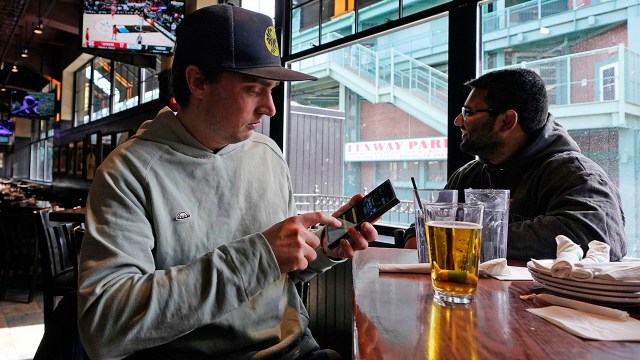
Public awareness of legal sports betting has grown in recent years – and so has the perception that it is a bad thing for society and sports, according to a new Pew Research Center survey.
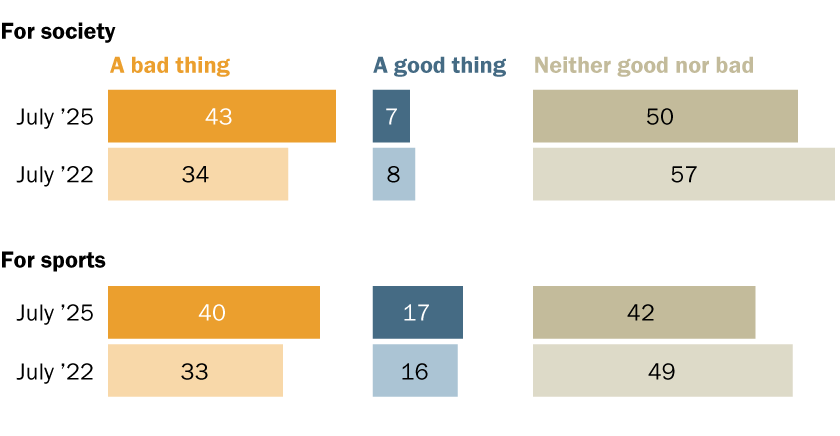
Source: Survey of U.S. adults conducted July 8-Aug. 3, 2025.
| For society (July 2022) | For society (July 2025) | For sports (July 2022) | For sports (July 2025) | |
|---|---|---|---|---|
| A bad thing | 34% | 43% | 33% | 40% |
| A good thing | 8% | 7% | 16% | 17% |
| Neither good nor bad | 57% | 50% | 49% | 42% |
Source: Survey of U.S. adults conducted July 8-Aug. 3, 2025.
Today, 43% of U.S. adults say the fact that sports betting is now legal in much of the country is a bad thing for society. That’s up from 34% in 2022. And 40% of adults now say it’s a bad thing for sports, up from 33%.
Despite these increasingly critical views of legal sports betting, many Americans continue to say it has neither a bad nor good impact on society and on sports. Fewer than one-in-five see positive impacts.
Meanwhile, the share of Americans who have bet money on sports in the past year has not changed much since 2022.
Today, 22% of adults say they’ve personally bet money on sports in the past year. That’s a slight uptick from 19% three years ago. This figure includes betting in any of three ways:
- With friends or family, such as in a private betting pool, fantasy league or casual bet
- Online with a betting app, sportsbook or casino
- In person at a casino, racetrack or betting kiosk
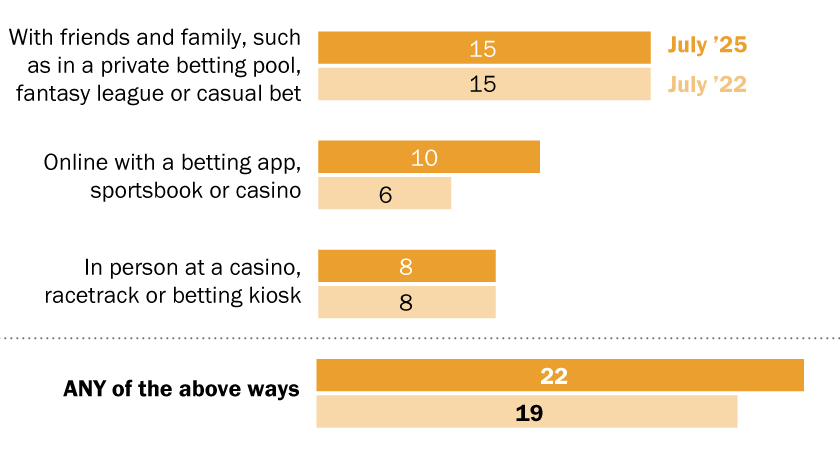
| July 2022 | July 2025 | |
|---|---|---|
| With friends and family, such as in a private betting pool, fantasy league or casual bet | 15% | 15% |
| Online with a betting app, sportsbook or casino | 6% | 10% |
| In person at a casino, racetrack or betting kiosk | 8% | 8% |
| ANY of the above ways | 19% | 22% |
All of this increase has come through online sports betting: 10% of adults now say they’ve placed a bet this way in the past year, up from 6% in 2022. There has been no change in the shares of adults who have bet on sports with family or friends or in person at a casino, racetrack or betting kiosk.
Commercial sports betting has spread rapidly across the United States since a Supreme Court ruling in 2018 gave states the green light to legalize it. At least 38 states, the District of Columbia and Puerto Rico now allow commercial sports betting in some form, according to the National Conference of State Legislatures.
In our new survey, 63% of adults say they’ve heard or read a lot or a little about the fact that sports betting is now legal in much of the U.S. That’s up from 56% in 2022. The increase in public awareness comes as betting-related advertisements have become common during sports broadcasts.
The rest of this analysis takes a closer look at Americans’ views of and experiences with sports betting. It’s based on the survey of 9,916 U.S. adults, conducted in July and August.
Many demographic groups increasingly view legal sports betting as a bad thing
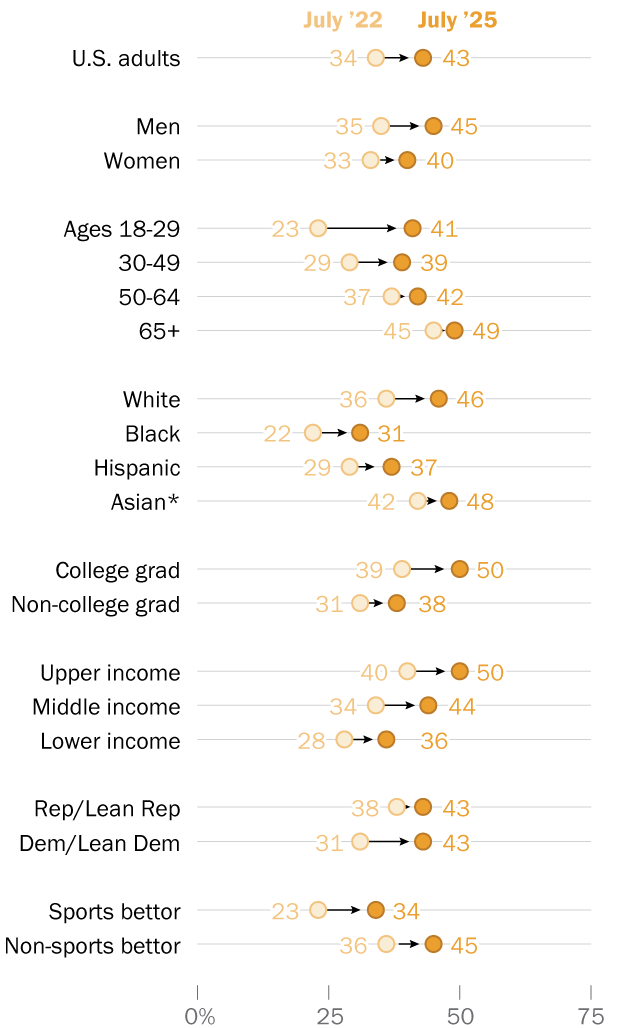
Source: Survey of U.S. adults conducted July 8-Aug. 3, 2025.
| July 2022 | July 2025 | |
|---|---|---|
| U.S. adults | 34% | 43% |
| Men | 35% | 45% |
| Women | 33% | 40% |
| Ages 18-29 | 23% | 41% |
| 30-49 | 29% | 39% |
| 50-64 | 37% | 42% |
| 65+ | 45% | 49% |
| White | 36% | 46% |
| Black | 22% | 31% |
| Hispanic | 29% | 37% |
| Asian* | 42% | 48% |
| College grad | 39% | 50% |
| Non-college grad | 31% | 38% |
| Upper income | 40% | 50% |
| Middle income | 34% | 44% |
| Lower income | 28% | 36% |
| Rep/Lean Rep | 38% | 43% |
| Dem/Lean Dem | 31% | 43% |
| Sports bettor | 23% | 34% |
| Non-sports bettor | 36% | 45% |
Source: Survey of U.S. adults conducted July 8-Aug. 3, 2025.
Since 2022, Americans in many demographic groups have become more likely to view the widespread legalization of sports betting as a bad thing for society, as well as for sports.
This is true for men and women; college graduates and non-college graduates; and upper-, middle- and lower-income Americans alike. It is also the case among Democrats and Republicans, as well as among those who have personally placed a sports bet in the past year and those who have not.
Some of the biggest shifts in attitudes about sports betting’s societal impact have come among young Americans – especially young men. Today, 47% of men under 30 say legal sports betting is a bad thing for society, up from 22% who said this in 2022. Women under 30 have also become more likely to express this view: 35% see legal sports betting as bad for society, up from 25% three years ago.
The legalization of sports betting has generated revenue for state governments and gambling operators, but it has also raised concerns about gambling addiction and other societal harms. Critics have also cautioned that it may compromise the integrity of sports. In recent years, several professional and college athletes and team personnel have been punished for violating betting rules.
Who has bet money on sports in the past year?
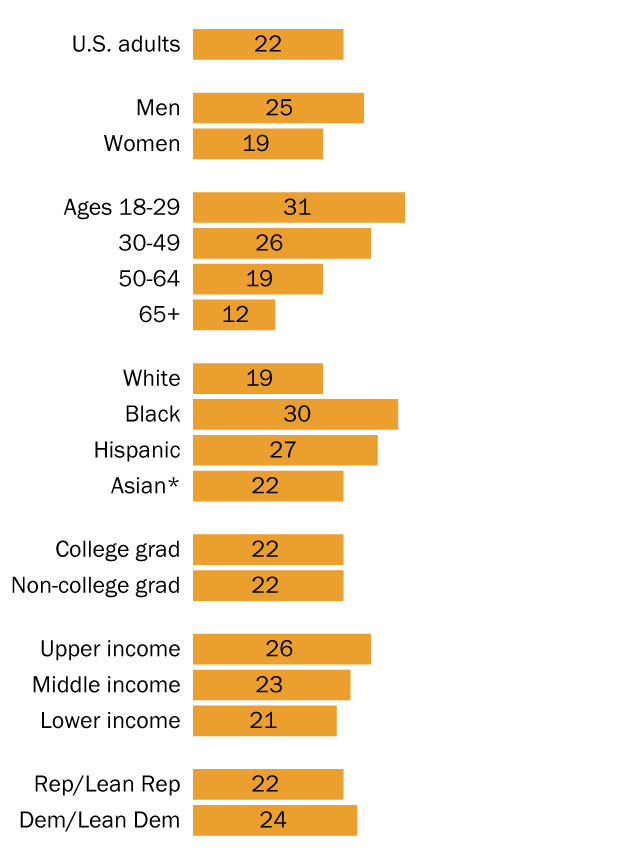
Note: White, Black and Asian adults include those who report being only one race and not Hispanic. Hispanic adults are of any race. Family income tiers are based on adjusted 2024 earnings. The full question wording was “With friends or family (such as a private betting pool, fantasy league, or casual bet).”
Source: Survey of U.S. adults conducted July 8-Aug. 3, 2025.
| July 2025 | |
|---|---|
| U.S. adults | 22% |
| Men | 25% |
| Women | 19% |
| Ages 18-29 | 31% |
| 30-49 | 26% |
| 50-64 | 19% |
| 65+ | 12% |
| White | 19% |
| Black | 30% |
| Hispanic | 27% |
| Asian* | 22% |
| College grad | 22% |
| Non-college grad | 22% |
| Upper income | 26% |
| Middle income | 23% |
| Lower income | 21% |
| Rep/Lean Rep | 22% |
| Dem/Lean Dem | 24% |
Note: White, Black and Asian adults include those who report being only one race and not Hispanic. Hispanic adults are of any race. Family income tiers are based on adjusted 2024 earnings. The full question wording was “With friends or family (such as a private betting pool, fantasy league, or casual bet).”
Source: Survey of U.S. adults conducted July 8-Aug. 3, 2025.
As was the case in 2022, some groups of Americans are more likely than others to say they’ve personally bet money on sports in the past year in any of the ways we asked about.
Young adults are more likely than older Americans to say they’ve placed a sports bet in the past year. Some 31% of adults under 30 say this, including 36% of men and 29% of women in this age group. Sports betting is less common in all older age groups.
Black and Hispanic adults are also especially likely to have bet money on sports in the past year: 30% and 27%, respectively, say they have done so. Roughly two-in-ten Asian (22%) and White (19%) adults say the same.
There are no differences between college graduates and non-college graduates on this question. In each group, 22% say they have bet on sports in the past year. Nor are there major partisan differences: 24% of Democrats and Democratic-leaning independents say they have done so, as have 22% of Republicans and Republican leaners.
Who has placed an online sports bet in the past year?
When it comes to online sports betting, young adults and Black Americans again stand out.
Overall, 17% of adults under 30 – including 21% of men and 16% of women in this age group – say they’ve placed an online sports wager in the past year. Three years ago, 7% of those under 30 had done so – including 9% of men and 6% of women.
Among Black adults, 19% say they’ve placed an online sports bet in the past year, up from 10% in 2022. Smaller shares of Hispanic (12%), Asian (11%) and White (8%) adults say they’ve done this in the past year.
Note: Senior Writer Drew DeSilver and Research Analyst Ted Van Green contributed to this analysis. Here are the questions used, the topline and the survey methodology.
